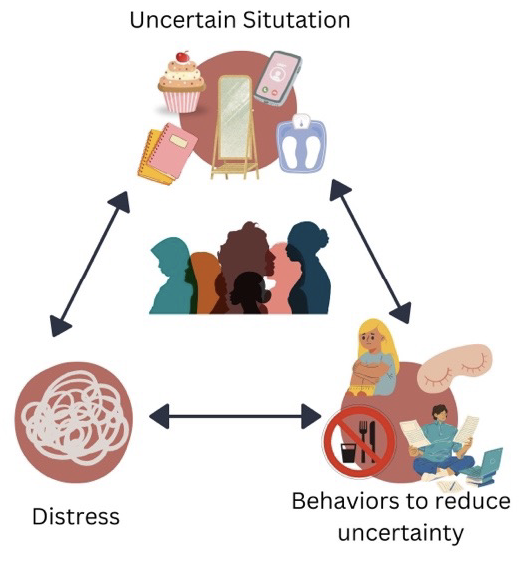by Kayla Costello
UNC CEED Summer Research Fellow and Clinical Psychology PhD student University at Albany, State University of New York
Mental health disorders are categorized by different symptoms often with the guidance of the Diagnostic and Statistical Manual of Mental Disorders (DSM),1 which is a guide to help clinicians diagnose mental disorders. For the last 10 years, researchers and clinicians are beginning to focus on what mechanisms, or internal processes that drive behaviors, are common across several disorders. The “transdiagnostic” approach to psychiatric disorders acknowledges the common overlap between disorders while identifying factors that are specific to individual disorders, like eating disorders, for example.2
One of the transdiagnostic mechanisms that researchers have identified is the notion of intolerance of uncertainty. Intolerance of uncertainty is a cognitive, emotional, and behavioral response to situations that are uncertain. Someone who is more intolerant of uncertainty is more likely to view uncertainty or uncertain situations negatively or as threatening, which in turn can have profound influence on their behavior, thoughts, and emotions.3
An example of this would be a friend inviting you to a party where you probably aren’t going to know many people. There are a lot of uncertainties around going to the party. “Who is going to be there?” “Will there be anyone for me to talk to?” “What types of food will be there; will I even like the food they have?”
Life is full of uncertainty and for someone who has difficulty with uncertainty, the world can be hard to navigate. Intolerance of uncertainty is not an all or nothing trait. It is more like a personality trait that someone has more or less of. Many researchers and clinicians see intolerance of uncertainty as at the root of worry and therefore playing a major role in the development of anxiety disorders such as generalized anxiety disorder.4
Recently, it has become clear that intolerance of uncertainty may also play a role in other conditions such as depression and eating disorders. Imagine someone with an eating disorder who has trouble tolerating uncertainty going to a restaurant and not knowing what is going to be on the menu, or having to step on the scale at a therapy appointment. These can be highly anxiety-provoking and even threatening experiences for someone with an eating disorder. Framing these experiences as intolerance of uncertainty can help loved ones and clinicians understand the distress and respond better to help during the recovery process.
People who are intolerant of uncertainty tend to engage in behaviors and thought patterns to reduce distress around uncertainty. These behaviors could be avoidance, excessive worry, and/or over-preparation for potential outcomes. In the moment, this might reduce feelings of distress; however, research has demonstrated that these behaviors are harmful in the long term because people don’t have opportunities to learn that uncertainty is not so threatening.5
How can you help people be more tolerant of uncertainty? Research in anxiety disorders and mood disorders shows that reductions in intolerance of uncertainty are associated with improvement in symptoms of these disorders.5,6 Clinicians focusing on reducing intolerance of uncertainty use problem-solving, exposure, and experiments designed to test specific worries about uncertainty to help people with uncertainty intolerance.7 Current research among people who are intolerant of uncertainty and have an eating disorder is not well established. Evidence is also mixed regarding the use of exposure-based treatments for eating disorders,8,9 and no research has been published on interventions focused on reducing intolerance of uncertainty among patients with eating disorders.
Clinicians and researchers are starting to work together to create treatment protocols that specifically target intolerance of uncertainty in people with eating disorders, and researchers are studying if these are effective treatments. The ultimate goal is to create treatments that target intolerance of uncertainty as a transdiagnostic mechanism. In turn, this will help improve eating disorder symptoms and symptoms of anxiety and depression.
References
1. American Psychiatric Association. Diagnostic and statistical manual of mental disorders. 5th ed., text rev. ed. 2022.
2. Dalgleish T, Black M, Johnston D, Bevan A. Transdiagnostic approaches to mental health problems: Current status and future directions. J Consult Clin Psychol. 2020;88(3):179-195. doi:10.1037/ccp0000482
3. Buhr K, Dugas MJ. The role of fear of anxiety and intolerance of uncertainty in worry: an experimental manipulation. Behav Res Ther. Mar 2009;47(3):215-23. doi:10.1016/j.brat.2008.12.004
4. Dugas MJ, Buhr K, Ladouceur R. The Role of Intolerance of Uncertainty in Etiology and Maintenance. Generalized anxiety disorder: Advances in research and practice. The Guilford Press; 2004:143-163.
5. Boswell JF, Thompson-Hollands J, Farchione TJ, Barlow DH. Intolerance of Uncertainty: A Common Factor in the Treatment of Emotional Disorders. J Clin Psychol. 2013;69(6):630-645.
6. Ladouceur R, Dugas MJ, Freeston MH, Léger E, Gagnon F, Thibodeau N. Efficacy of a cognitive-behavioral treatment for generalized anxiety disorder: evaluation in a controlled clinical trial. J Consult Clin Psychol. Dec 2000;68(6):957-64.
7. Dugas MJ, Ladouceur R. Treatment of GAD: Targeting intolerance of uncertainty in two types of worry. Behav Modif. 2000;24(5):635-657.
8. Steinglass J, Albano AM, Simpson HB, Carpenter K, Schebendach J, Attia E. Fear of food as a treatment target: exposure and response prevention for anorexia nervosa in an open series. Int J Eat Disord. May 2012;45(4):615-21. doi:10.1002/eat.20936
9. Hildebrandt T, Bacow T, Markella M, Loeb KL. Anxiety in anorexia nervosa and its management using family-based treatment. Eur Eat Disord Rev. Jan 2012;20(1):e1-16. doi:10.1002/erv.1071
